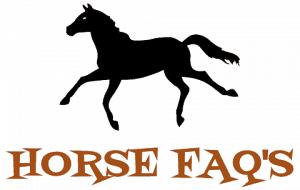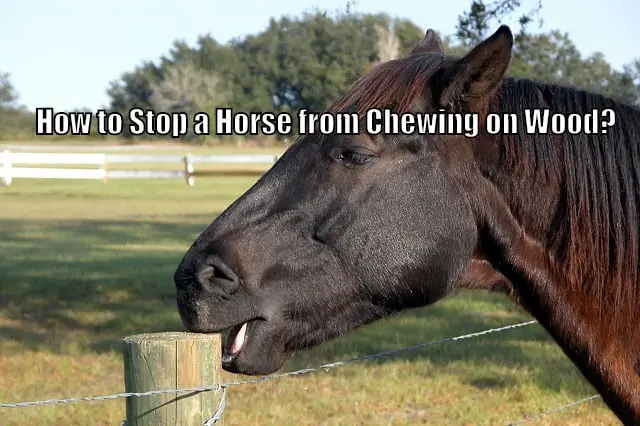Seeing your creatively crafted stable fences with crumbled and scalloped edges is something that will surely get on your nerves without the known culprit! But what if your horses are the ones who did it? You will feel roller-coaster of emotion like a mixture of anger and irritation but with more of the concerned feeling towards your horses. Well, being the culprit behind this not-so-heinous crime will never a reason to stop caring for them, right? We should start worrying about them because it is a sign that your horse’s health is at risk. Continuously chewing and swallowing bits of wood from your fences can cause them some digestive problems so this is something that surely needs to give out attention to. For owners and handlers, what kind of prevention can you do to stop this kind of unhealthy habit?
How to stop from chewing on wood? Before we answer this, let us first identify the reasons behind this unhealthy habit of your horses. Generally, equines chew on food mainly caused by these three reasons: (a) boredom or frustration, (b) habit, and (c) nutrient deficiency. Different horses can have any of these three, but for most owners and handlers, they try to solve these all by a few named ways. Some increases turnout time for their horses so they can have more time to see more of life outside their stables, some seeks for veterinarians’ help for this might indicate lacking essential nutrients among horses. Some owners try to do feeding tricks like giving out more long-stemmed and chewy hay so their horses will not turn to wood just to satisfy their internal desire to chew.
What other things can be considered as part of prevention?
When owners have been observing this kind of habit being done by their horses, one of the most common things that they do first go on the least expensive solution. People try to cover those fences on their horses’ stables with some sprays, pastes or washes that can eventually add some bitter or awful taste on the wood. With this, horses will not choose to bite and chew those fences considering the very sensitivity of their mouth and tongue. However, this method should be maintained and be done regularly especially during times when they have been already washed off by rain, and the bitter taste of the wood comes off naturally. Before I forgot this, one thing that must also be considered here is the toxicity of the paint, paste or oil that you are putting on your fences. Some can be too harmful to your horses so if you are considering applied chemical chewing deterrent, choose the products that are safe and approved for horses to be used.
Another method that most owners also do is by covering the fences with plastic mesh or small-mesh chicken wires. Somehow this one is way safer and better than using chemicals for fences. This one is being done by covering the posts around as well as the poles and boards, and with this, horses cannot fully chew through the provided mesh, and it somehow stops their desire to chew more beyond the coverings.
When wood chewing has gone beyond just a habit
As I have mentioned earlier, wood chewing is something that can be dangerous to your horse’s health most especially if they get to swallow harmful materials present or attached on wood fences like staples, nails and even chemicals like arsenic that is known to be naturally present on pressure-treated woods. To seek help from knowledgeable people in the field is the best thing to do for our horses when this kind of unhealthy habit has gone worse.
Nutrition counseling is first to be considered on the list when seeking for some medical and science-based help. This is being suggested by veterinarians after knowing the kind precisely what kind of diet does your horse currently taking. Professional nutritional counselors for animals are available to guide you, owners and handlers, in choosing the ideal diet for your horse. With the additional nutrients and fiber to your horse’s diet may eventually prevent him from wood chewing.
On the other hand, excessive or too much wood chewing has become evident to your horse’s behavior, veterinarians usually recommend a behavioral specialist. This person will be the one responsible for changing that kind of abnormal behavior by replacing with other activities that will divert the horse’s attention from chewing all the wood around his stable.
Replacement and maintenance of good and safe fencing are an expensive one, but an ill and sickly horse will cost you even more. Finding the best solution to this problem can benefit you all a lot and can as well ensure your horses’ health and safety.
Related Questions:
- What other factors can trigger wood chewing among horses?
- Limited food or forage in the horse’s stable or area
- Inadequate fiber in horse’s diet
- Over confinement in an enclosed place
- Changes in activity level
- Low-quality of pasture
- What kind of trees/woods that are not advisable to use when building stables/fences?
As I have said, there are woods that simply contain harmful chemicals for horses and are not advisable to use in building fences. These types of woods are generally from these trees:
- Wild and domestic cherry trees
- Peach trees
- Black locust trees
- Black walnut trees
- Pine trees
- How important are turnouts for horses?
Generally, horses that are kept indoors are more likely to develop wood chewing habits because there is an increased chance for them to get bored and be frustrated. Hence, enough room or place for our horses to have them self-exercise and explore more of life outside their stables is advisable. This allows your horses to live naturally with the environment as well as with other horses. Another benefit that horses can get is by having plenty of grass to feed on whenever they are outside, therefore, fewer chances of being involved to wood chewing.

